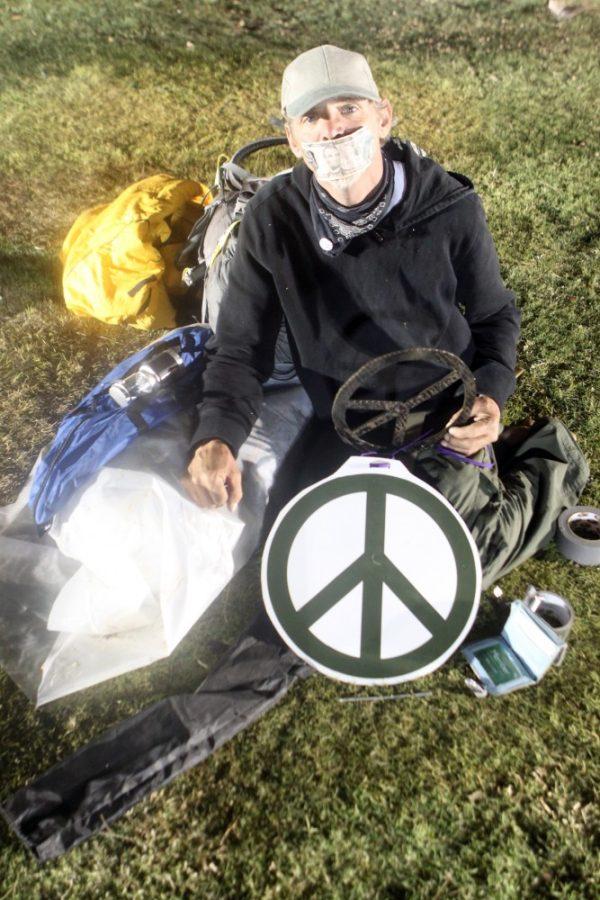Wall Street isn’t greedier than the “99 percent,” according to a UA professor who analyzed the Occupy movement using his study that examined the public’s perception of greed.
Stephen Gilliland, head of the management and organizations department in the Eller College of Management and the executive director of the Center for Leadership Ethics, looked at Wall Street Journal articles from the last 25 years and counted how many times they discussed corporate greed. When the stock market dropped, the Wall Street Journal reported on greed more often, Gilliland said.
But Wall Street’s behavior throughout the 2000s was very similar to what bankers were doing during the past 30 years, Gilliland said.
“This perceived greed turns out to be a way to blame others for our own misfortune,” he said. “And it’s easy to blame Wall Street bankers, but from 2001 to 2007, we were pretty big fans of what they were doing. Then everything went south, but Wall Street didn’t do anything differently.”
Although Wall Street’s decisions contributed to dumping the US into a recession, so did the actions of people who took out mortgages they couldn’t afford, Gilliland said.
“One of the common signs you see in this movement is ‘We are the 99%.’ They’re implying that the 1 percent is greedy. We’re all responsible for the financial recession we’re in, but we don’t want to admit that,” Gilliland said. “We want to blame somebody.”
Fundamentally, the Occupy movement is a good idea and people should be voicing their outrage at a failed system, Gilliland said. However, a lack of regulations on financial institutions and dealing with a financial system that became too complex to handle are more likely reasons for the recession than greedy CEOs, he said.
Occupy Wall Street, a movement to expose what protesters call disproportionate corporate and wealthy influence in politics, started on Sept. 17. Occupy Tucson began on Oct. 15 in Armory Park, said Erin Whitfield, a coordinator for Occupy Tucson. Whitfield said Gilliland’s analysis was ignorant. She said everyone from the unemployed to Foothills residents represent Occupy Tucson.
Sabrina Ball, an aerospace engineering sophomore, said Occupy members are probably motivated because they think Wall Street is greedy, but she wasn’t sure if that is accurate.
Justyn Dillingham, a 2009 UA graduate and former Daily Wildcat editor who attended the first day of Occupy Tucson, said he hasn’t gone back because he has problems with the way the movement conducts itself. However, Dillingham said Gilliland’s assessment is misguided because the Occupy movement calls for financial regulation and the wealthy to be taxed, and members aren’t just spewing blind resentment.
Besides blaming the average person’s irresponsible behavior, Dillingham agreed with Gilliland’s explanation for the recession.
“Corporations exist to make money; that is their only reason for existence,” Dillingham said. “We shouldn’t expect them to be either ‘greedy’ or ‘benevolent’; they aren’t people. The recession cannot be attributed to lack of personal responsibility. The average citizen has absolutely no power over the economy.”
Rachael Sacks, a freshman studying geography and sociology, agreed with Gilliland. She added that since Occupy Tucson doesn’t even know what it wants, it can’t be taken serious.
Occupy Tucson keeps saying, “Down with the 1 percent,” but does not determine specifically what it wants, Sacks said.
Whitfield said many people forget that Occupy Tucson isn’t even a month old and that the movement has had many obstacles to deal with. The movement is still organizing, she said.
Regulations on financial institutions must be critiqued continuously, banks need to start lending more and the ‘next big thing’ would contribute tremendously to boosting the economy, Gilliland said. He said he expects the Occupy movement to stimulate solutions to many of the country’s problems.
“The more people become aware of the interplay between business, politics and personal responsibility in making our situation, the better,” Gilliland said. “It’s okay to publicly demonstrate, but we should also be looking at our personal roles in making this situation.”









